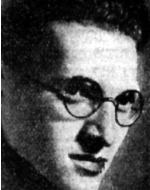Liwerski, Jacob (Yasha)
Son of Deborah and David, was born on the 5th of Tevet 5613 (5.1.1913) in Odessa, Russia. At the end of the First World War he moved with his parents to Romania. His parents were wealthy and Jacob knew Simcha childhood. When the Zionist idea began to buy him followers in the neighborhood, he immediately found echoes in his Lev. Yaakov was one of the first members of the Hashomer Hatzair movement in Bucharest and one of its most important leaders. He devoted himself with special enthusiasm to guiding the younger class. In 1934 he immigrated to Israel and studied at the Hebrew Technion in Haifa as an architect. For a while he worked as a member of the cement group, then in Ness Ziona, now in Sarid, but he did not persist in this way. Contradictory desires fought within him, and this internal war shaped his character and character. He passionately loved art, poetry, philosophy, and yet he often seemed to be a child in his excitement. Jacob loved to argue and argue, but a thread of humor was woven in all his arguments. From the day he arrived in Israel, he joined the Hagana and took part in its activities. At the outbreak of the bloody events of 1936-1939 he joined the Nutras and served in Haifa, Hanita and Tirat Zvi. With the outbreak of the War of Independence after the United Nations General Assembly decided on 29 November 1947 to partition the country, he volunteered for active duty in the Haganah and served in the Carmeli Brigade, and was wounded in Wadi Nisnas a month before the liberation of Haifa. Mount Carmel was joined to one of the battalions as a platoon commander and took part in operations in Atlit, Akko, and Sejera, and fell on Sejera on June 10, 1948, after being wounded in a battle for an outpost between Lubia and Sejera. His deputy carried him away from the place of battle, but Jacob ordered him to leave him and return to the people. During the retreat, his friends could not carry him, and the next day, when the regiment was taken back, they found that he had died of blood loss. Yaakov was laid to rest in the military cemetery in Afula, along with several of his men who fell in the same battle. His books in the technique were given by his friends to the Technion Library in Haifa and constitute a special collection.
